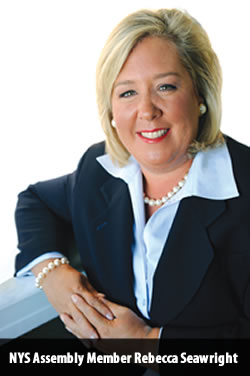GUEST EDITORIAL
Stop the Bans
By Assembly Member Rebecca Seawright, 76th District
 It is a historic year for women in New York State. We passed a bill that I was proud to cosponsor, the Reproductive Health Act (RHA), which codifies Roe v. Wade into New York State law. On the day that the RHA was signed, I was proud to present my mentor Dr. Sarah Weddington, the attorney who successfully argued Roe v. Wade with a Legislative Proclamation to honor her on this momentous occasion. It was an honor to stand beside her as I debated our bill in chamber and cast my vote in the affirmative. Signed by Governor Cuomo, the RHA codifies the protections of the Roe v. Wade decision of 1973 into State law and recognizes that abortion is health care, moving it into the public health law. The legislation is preempting the attacks of a hostile administration and the alarming possibility of Roe being overturned. That is the silver lining for women in New York State — we have statutory protections to access safe, legal abortion care, even if Roe is further eroded or overturned in the federal courts. I hope other states will follow our lead and increase access to abortion care instead of rolling back constitutional protections.
It is a historic year for women in New York State. We passed a bill that I was proud to cosponsor, the Reproductive Health Act (RHA), which codifies Roe v. Wade into New York State law. On the day that the RHA was signed, I was proud to present my mentor Dr. Sarah Weddington, the attorney who successfully argued Roe v. Wade with a Legislative Proclamation to honor her on this momentous occasion. It was an honor to stand beside her as I debated our bill in chamber and cast my vote in the affirmative. Signed by Governor Cuomo, the RHA codifies the protections of the Roe v. Wade decision of 1973 into State law and recognizes that abortion is health care, moving it into the public health law. The legislation is preempting the attacks of a hostile administration and the alarming possibility of Roe being overturned. That is the silver lining for women in New York State — we have statutory protections to access safe, legal abortion care, even if Roe is further eroded or overturned in the federal courts. I hope other states will follow our lead and increase access to abortion care instead of rolling back constitutional protections.
Today, over 50% of our United States restrict or severely restrict access to reproductive healthcare. Within the past three months, Georgia, Ohio, Mississippi, Kentucky and now Alabama, have enacted laws that severely restrict access to abortion, sometimes as early as six weeks into a pregnancy. The Alabama law, recently signed by its governor, bans abortion in nearly all cases, with no exceptions for rape or incest, and carries up to a 99-year prison sentence for doctors who perform the procedure. Roe v. Wade, the 1973 Supreme Court decision that established a constitutional right to abortion until fetal viability, around 24 weeks of pregnancy, is under attack — all or part of Roe could be overturned by our US Supreme Court’s new conservative majority, leaving it to each state to regulate abortion with its own laws. The anti-choice movement is closer than ever to its ultimate goal of banning all abortion and punishing women.
Opponents of abortion access are fueled by policy proposals to indirectly challenge choice. Decision-makers in conservative states will often whittle away at access to a safe and legal abortion by imposing upon the regulations surrounding clinics, abortion doctors, insurance policies, and adding hurdles such as mandatory ultrasounds, counseling and waiting periods. Georgia’s governor signed a so-called ‘heartbeat bill’ to ban abortions after fetal cardiac activity can be detected, which can be as early as six weeks into a pregnancy. Using the word heartbeat is a play on emotions and effectively bans abortions as most women don’t even know they’re pregnant at six weeks. Supreme Court justices may be reluctant to wade into the abortion debate during an election year, as 7 in 10 Americans across the country believe that abortion should be legal but protections under Roe are still at risk. The reality is that overturning Roe would make it impossible for a majority of American women to access a safe and legal abortion.
We forge ahead as lawmakers, as reproductive rights are central to achieving gender equality. As for me, I am lead sponsor on legislation to anchor our rights in our New York State Constitution with an Equal Rights Amendment (ERA), so stay tuned. Over ten million women live in New York State, so adding the ERA is key! I look forward to activating with my sisters and building upon the momentum created by pro-choice allies, elected officials and constituents in demanding equal protections and greater reproductive freedoms for women across our nation. We are stronger together and must fight back against the anti-choice agenda for ourselves, our families, our daughters and our sons in 2020. #
